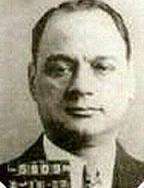Vincent Mangano
| Vincent Mangano | |
|---|---|
 | |
| Born |
Vincenzo Giovanni Mangano March 28, 1888 Palermo, Sicily |
| Died |
April 19, 1951 (aged 63) New York, U.S. |
| Other names | "The Executioner" |
| Relatives | Philip Mangano (brother) |
Vincent Mangano (pronounced MAHN-ga-noh) (March 28, 1888 – April 19, 1951), born Vincenzo Giovanni Mangano, also known as "The Executioner" as he was named in a Brooklyn newspaper, was the head of what would come to be known as the Gambino crime family from 1931 to 1951. His brother Philip Mangano was his right-hand man and de facto, or substituto, underboss. He is also a distant paternal relative of current Genovese crime family underboss Venero Mangano and a suspected relative of Lawrence Mangano.
Vince as head of the Gambino family
Mangano was named head of what was then the Mineo family in 1931, following the Castellammarese War. He was one of the original bosses of the modern Five Families, the others being Joe Bonanno, Lucky Luciano, Joe Profaci and Tommy Gagliano.
Mangano was an older mafioso who was very much steeped in the Old World ideals of "honor," "tradition," "respect" and "dignity." While he was still in many ways a Mustache Pete, he was more forward-looking than Maranzano and Joe Masseria, and was thus allowed to stay in power after Luciano and the other "Young Turks" eliminated Maranzano.
Mangano and Camarda established the City Democratic Club, which promoted bedrock American values in the front room, while illegal activities were planned in the backroom. It became a regular meeting place for the members of Murder, Inc., the infamous gang of assassins who, for a price, did the bidding of syndicate mobsters. Vincent's underboss, Albert "Mad Hatter" Anastasia, was also operating head of Murder, Inc. and was a frequent patron of the club, as was Phillip Mangano.
Mangano made the waterfront his family's main income producer. He and his associates would threaten to prevent cargo from being loaded or unloaded if the shipping company refused to pay a tribute. This effort was helped by the family's control of Brooklyn Local 1814 of the International Longshoremen's Association; its president, Anthony Anastasio (Albert's brother; he kept the original spelling of his last name) was a member of the family. Mangano would force workers to pay a fee for every day they worked on the docks - because of this, the mob knew exactly what was on each ship and could choose what to steal.
Other prominent members during Mangano's time were Joseph "Piney" Armone, future underboss Aniello "Neil" Dellacroce, and future bosses Carlo Gambino and Paul Castellano.
Feud with Anastasia
Mangano was the only one of the post-Castellammarese War bosses who retained the old ways. Over time, resentment grew from a new breed of mob leaders, including his underboss, Anastasia. Mangano grew to resent and mistrust Anastasia, and particularly objected to other mobsters such as Luciano, Frank Costello and Louis "Lepke" Buchalter using Anastasia's services without Mangano's permission. Anastasia, for his part, increasingly preferred the company of younger mafiosi such as Luciano and Costello. The two men regularly argued and fought, having to be pulled apart - possibly for the protection of the elder Mangano who was no physical match for his younger underboss.
Disappearance
Although it took 20 years of working together for matters to come to a head, Mangano eventually met his end at the hands of Anastasia, or so it is believed.
In 1951, Anastasia is believed to have heard of a plot to kill him being formed by his boss, and decided to take pre-emptive action in what he ultimately described as "self defense." Philip Mangano was found murdered near Sheepshead Bay, Brooklyn on April 19, 1951. Vincent also vanished the same day without trace. His body has never been found. Anastasia then took over the family. Although Anastasia never admitted to having a hand in the Mangano murders, he managed to convince the heads of the other families that Vincent Mangano had been plotting to have him killed (a claim backed up by Frank Costello). The Commission thus confirmed Anastasia as the boss of the renamed Anastasia family.
Further reading
- Bonanno, Joseph. A Man of Honor: The Autobiography of Joseph Bonanno. New York: St. Martin's Press, 2003. ISBN 0-312-97923-1
- Capeci, Jerry. The Complete Idiot's Guide to the Mafia. Indianapolis: Alpha Books, 2002. ISBN 0-02-864225-2
- Davis, John H. Mafia Dynasty: The Rise and Fall of the Gambino Crime Family. New York: HarperCollins, 1993. ISBN 0-06-016357-7
- Jacobs, James B., Christopher Panarella and Jay Worthington. Busting the Mob: The United States Vs. Cosa Nostra. New York: NYU Press, 1994. ISBN 0-8147-4230-0
- Mannion, James. 101 Things You Didn't Know About The Mafia: The Lowdown on Dons, Wiseguys, Squealers and Backstabbers. Avon, Massachusetts: Adams Media, 2005. ISBN 1-59337-267-1
- Milhorn, H. Thomas. Crime: Computer Viruses to Twin Towers. Boca Raton, Florida: Universal Publishers, 2005. ISBN 1-58112-489-9
- Raab, Selwyn. Five Families: The Rise, Decline, and Resurgence of America's Most Powerful Mafia Empires. New York: St. Martin Press, 2005. ISBN 0-312-30094-8
- Schatzberg, Rufus, Robert J. Kelly and Ko-lin Chin, ed. Handbook of Organized Crime in the United States. Westport, Connecticut: Greenwood Press, 1994. ISBN 0-313-28366-4
External links
| Business positions | ||
|---|---|---|
| Preceded by Frank Scalise |
Gambino crime family Boss 1931–1951 |
Succeeded by Albert Anastasia |
| Preceded by Lucky Luciano as chairman of the Commission |
Capo di tutti capi Chairman of the Commission 1946–1951 |
Succeeded by Frank Costello as chairman of the Commission |
| ||||||||||||||||||||||||||||||||||||||||||||||||||||